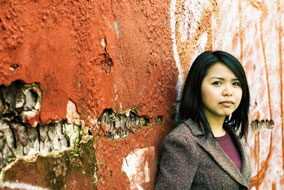
Denise Valdecantos works with prostituted Asian women and children in the Downtown Eastside - photo by Martin Dee UBC Reports | Vol. 52 | No. 5 | May 4, 2006
Nursing Grad Cares for Victims of Sex Trade
By Hilary Thomson
A family photo of a four-year-old girl proudly wearing a plastic stethoscope may have been the first hint of her future career, says School of Nursing graduate Denise Valdecantos.
The 25-year-old’s journey belies the innocence of that early picture: much of her work involves prostituted Asian women and children, both in Vancouver’s Downtown Eastside and in the Philippines.
Working for a year as a Canadian International Development Agency intern, she spent time in Philippine “red light districts,” usually near U.S. naval bases.
“Living conditions were often horrific,” she says. “Some prostituted children were forced to live in cement stalls, like animals. The women were poor and uneducated about safe sex practices. Some were using candy wrappers for condoms.”
Valdecantos helped develop a culturally sensitive HIV/AIDS education module and worked directly with prostituted women and children.
“It was very intense emotionally. When I came back to Canada, it was hard to re-adjust. I felt disconnected for a while.”
She has worked with several Vancouver sexual health education programs targeted to youth, and she currently volunteers at the Philippine Women Centre of B.C. in Vancouver’s Downtown Eastside, where she works with migrant and trafficked women — some sold as “mail-order brides.”
“The most satisfying part for me is therapeutic communication — hearing women’s stories and knowing I have something to give,” says Valdecantos, whose family emigrated from the Philippines and includes many nurses.
Her other focus is mental health, which benefits her work with prostituted women.
“Many of the women I work with also suffer from depression and physical abuse. As a nurse, I can address both physical and psychiatric issues.”
Valdecantos is now working at Lion’s Gate Hospital Neurology Dept. and hopes to eventually return to the Philippines to work for a few years.
“A big part of why I love this profession is that it allows me to combine nursing care with teaching and travel — things I love to do.” |
